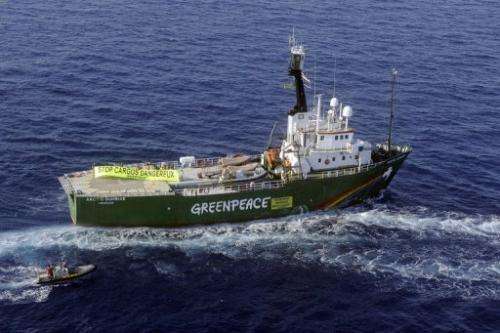Greenpeace says Russia denies it Arctic access

Greenpeace said Wednesday that Russia had denied its ship access to Russian Arctic waters to hide the extent of its lucrative energy exploration work in the fragile ecosystem.
The global environmental lobby group said its Arctic Sunrise icebreaker intended to enter the Northern Sea Route to protest at work being conducted jointly by Russia's Rosneft energy giant and its US partner ExxonMobil.
Arctic Sunrise confronted the Rosneft-contracted Akademik Lazarev last week near the Barents Sea as the Russian vessel was performing powerful seismic sounding tests.
The environmental watchdog said Russian authorities had refused it permission to enter the Northern Sea Route on three separate occasions citing concerns about the ship's ability to withstand thick ice.
"This is a thinly veiled attempt to stifle peaceful protest and keep international attention away from Arctic oil exploration in Russia," Greenpeace Arctic campaigner Christy Ferguson said in a statement.
"The decision to deny us entry to the Kara Sea is completely unjustified and raises serious questions about the level of collusion between the Russian authorities and the oil companies themselves."
Russia's transport ministry did not issue an immediate comment.
Greenpeace said Rosneft and ExxonMobil currently had six vessels in the area conducting survey work under an agreement signed between the two world energy majors in August 2011.
"None of the six oil exploration vessels operating for Rosneft and ExxonMobil in the area has an ice classification as high as the Arctic Sunrise," the Greenpeace statement said.
The Kara Sea sits at the tip of Western Siberia and represents a key stretch of the Northern Sea Route that connects Asia and European markets in summer months.
Both the Russian and US energy companies hope that environmental warming gradually melting the ice will help them tap the vast oil and natural gas resources believed to be buried in the Arctic soil.
The US Geological Survey estimates that the region hides more than a tenth of the world's undiscovered oil and nearly a third of its untouched natural gas reserves.
© 2013 AFP




















